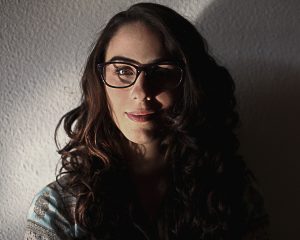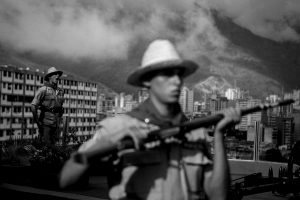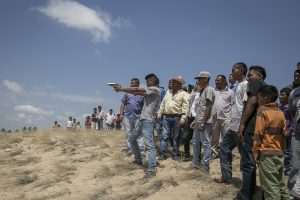By Atina Dimitrova
1 March 2019

Caracas-born photojournalist Fabiola Ferrero talks to Atina Dimitrova about her dangerous career and how she deals with documenting tragedy.
As fifteen guerrillas surrounded her and forced her to hand over her protective vest, gas mask, helmet and camera equipment, Fabiola Ferrero tried to block the anxiety from her mind. Her attempts to remain calm failed after ten minutes, when she started feeling angry instead. Despite that incident in her home country Venezuela in 2017, Fabiola continued covering the anti-government protests there. Because of her determination to report, the facts prevailed.

A freelance photojournalist who grew up in Caracas, one of the deadliest capital cities in the world, Fabiola, 27, says, ‘These types of situations happen often here. I was ten years old the first time somebody pointed a gun at me during one of the conflicts here.’
Staring into space as if trying to collect her memories, Fabiola shares her stories from Caracas over Skype. The distance between her and me in London is about 7,500km. She explains that threats delivered to journalists and citizens are common. ‘My goal is to bring to light the dynamics of Latin America and how we behave in hostile conditions,’ says Fabiola. ‘I want to help the others understand how we manage to live under circumstances which are completely against us.’
Fabiola’s life in Venezuela was marked by violence and social injustice, which she started reporting on in her youth. She says that journalists are sometimes attacked just outside their homes by armed groups. ‘I don’t have any friends in the country. They all left,’ she says slowly. ‘The biggest diaspora of our history is happening right now. Almost two million people have left since Hugo Chávez took power in 1999.’ She takes a long pause. ‘My family left as well.’
Her voice trembles. But Fabiola is proud to continue covering the conflict for international news outlets such as the BBC, The Wall Street Journal, and Bloomberg. She does not want to let events go unreported in South America or on other continents, as she believes that every individual story symbolises the universality of pain. ‘When you face tragedy, it tells you all what it is to be a human,’ she says.

She has explored how communities react to violence for both national and international audiences since 2015. Fabiola collects people’s anecdotes on her camera, and some of these stories have been part of group exhibitions in the UK, the Netherlands, Germany and Venezuela.
‘I need to accept the fact that I can’t always detach myself and that I don’t own the truth. I can only try to be as honest as I can,’ she says. A TV news bulletin in Spanish is playing in the background in her home in Caracas, as Fabiola explains the complexity of the conflict and the numerous ways in which it could be interpreted.
She learnt the secrets of her craft at the Caracas-based Andrés Bello Catholic University while obtaining her journalism degree. ‘You could be inspired by your professors and you could learn a lot from reading, but no one in a classroom could teach you how to react when somebody tells you that they’re going to kill you by the end of the day. The only way to learn is going to the streets and reporting.’
What she describes did in fact happen to Fabiola when she was working on a story for The Wall Street Journal. The piece was about 100,000 illegal miners and armed gangs in Venezuela. They were believed to be paying local military commanders for protection and gasoline supplies. During this mission, armed men who were taking care of Fabiola and her colleagues made a joke that they were going to show them in the gold mines and then throw the team into a lagoon by the end of the afternoon. Fabiola acknowledged that it was a possible scenario. She tried to stay as focused as possible in order to take powerful photos of the mines regardless of what was about to happen. And she was glad that what the armed men said proved to be a trick to scare her and that her team was not in danger.

Despite the difficulties she has faced in her career, Fabiola’s face radiates so much determination. She is also proud to have worked on a story about a five-year-old child in Venezuela who has cancer. Every two weeks the family has to make a 14-hour bus journey from their home town, San Cristóbal, near the Colombian border, to Caracas for the child to receive chemotherapy. Fabiola covered the story for Yahoo News to raise awareness of the severe medicine shortage in Venezuela. ‘Those types of stories are hard to work on,’ adds Fabiola. ‘I have to try really hard not to absorb people’s sadness as my own. I sometimes just get so involved with people when I photograph them, so when I get home I’m completely drained and sad.’
One such difficult period made her leave Venezuela in 2016 for almost a year. Fabiola went to Spain where her brother lives, and she tried to clear her mind from all the unpleasant experiences she had in Venezuela. While abroad, she decided to publish a photobook, called Oblivion. ‘I did it to heal myself; to be completely away from photojournalism,’ says Fabiola.

But the passion to explore the psychological consequences of crisis in Latin America recently prompted Fabiola to go back to Venezuela. She is now also photographing communities in Colombia that are completely forgotten by the state. Fabiola shows how people try to live normally during conflicts that have lasted for five decades. ‘It’s very difficult to believe that the reality will change because of our pictures,’ says Fabiola. ‘But there are ways to work directly with communities to help them question their identity and create self-image. Hopefully in the future I’ll do more reporting on that and expand my work throughout Latin America. I don’t know about legacy. But hopefully I’ll improve some people’s lives.’
The time is ticking away. There are twenty minutes left before Fabiola has to go on her next assignment. She risks her life to promote change. Armed with her camera and strong inner values, Fabiola nibbles a chocolate bar and gets ready to go. While rubbing her eyes — she is sleep-deprived again — she concludes, ‘I want to use photography to heal others with my work.’
Atina is an MA International Relations student at King’s College London. She is also a freelance social media editor at MailOnline and a freelance broadcast journalist at the BBC. She is the author of two novels and has work experience across a range of media outlets, such as The Guardian and News UK. You can follow her on Twitter @atinadimitrova1.
All photos have been published here with the permission of the photographer.
Atina Dimitrova
Atina is an MA International Relations student at King’s College London. She is also a freelance social media editor at MailOnline and a freelance broadcast journalist at the BBC. She is the author of two novels and has work experience across a range of media outlets, such as The Guardian and News UK. You can follow her on Twitter @atinadimitrova1.